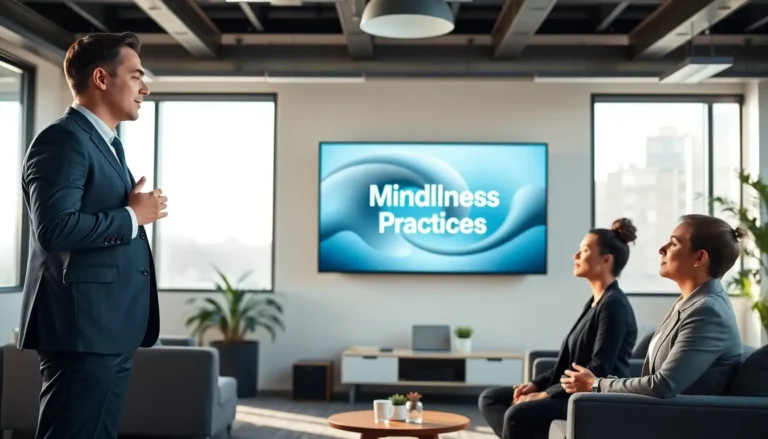Table of Contents
ToggleIn a world buzzing with distractions, finding time to reflect can feel like searching for a needle in a haystack—while blindfolded. Yet, cultivating reflective habits isn’t just a nice-to-have; it’s the secret sauce for personal growth and success. Imagine being able to learn from your experiences instead of just letting them slip away like a forgotten sock in the dryer.
Overview of Reflective Habits
Reflective habits play a crucial role in personal and professional development. They involve regularly examining thoughts, actions, and experiences to gain insights. Individuals who practice these habits can identify patterns in their behavior and understand their motivations.
Setting aside time for reflection, even in busy environments, becomes essential. This process allows for meaningful personal growth and informed decision-making. Many people find that engaging in reflective practices results in enhanced problem-solving skills and greater creativity.
Different methods can facilitate reflection. Journaling serves as an effective tool for capturing thoughts and feelings, making it easier to analyze experiences. Meditation also aids in fostering mindfulness, enabling deeper self-awareness. Another popular method is discussing experiences with a trusted friend or mentor.
Establishing consistent reflective habits requires commitment. Allocating specific times for reflection helps individuals prioritize this practice amid daily distractions. Maintaining a structured approach can lead to more effective evaluations of experiences over time.
Developing these habits results in significant long-term benefits. Enhanced self-awareness fosters better relationships and communication skills. Individuals who reflect on their experiences often achieve higher levels of emotional intelligence. Reflective habits contribute to a greater understanding of personal values and goals, aligning actions with aspirations.
Incorporating reflective practices into daily routines creates opportunities for continual growth. Embracing this process helps individuals navigate challenges more effectively while learning from past experiences.
Importance of Reflective Habits

Reflective habits play a crucial role in enhancing both personal and professional development. These practices lead to valuable insights that foster continual improvement.
Personal Growth
Reflective habits support personal growth by increasing self-awareness. They enable individuals to analyze their experiences and recognize areas for improvement. Skills in self-reflection aid in understanding emotional responses, helping people navigate life’s ups and downs more effectively. Individuals who regularly engage in reflection can identify patterns in their behavior, leading to healthier relationships and better decision-making. Journaling serves as a powerful tool within personal growth, allowing for deeper exploration of thoughts and feelings. Regular reflection ultimately transforms challenges into opportunities for growth.
Professional Development
Reflective habits also significantly impact professional development. Employees who engage in regular reflection can identify strengths and weaknesses in their performance. This practice leads to the enhancement of problem-solving skills and increased creativity, both essential in today’s fast-paced work environment. Furthermore, discussions with mentors or colleagues can open new perspectives, enriching insights gained through reflection. Professionals who embrace reflective practices cultivate adaptability, allowing them to respond effectively to challenges and align their work with organizational goals. Committing to reflection enhances overall job satisfaction and fosters a culture of continuous learning.
Types of Reflective Habits
Reflective habits come in various forms, helping individuals effectively analyze their thoughts and experiences. Two main categories incorporate daily practices and structured techniques to foster personal growth.
Daily Reflection Practices
Daily reflection practices focus on routine assessments of thoughts and actions. Individuals often start by journaling, writing down feelings and experiences to gain clarity. Another method involves setting aside a few minutes for mindfulness or meditation, allowing thoughts to settle and insights to emerge. Sharing thoughts with trusted friends or family can also provide valuable feedback, enhancing understanding of personal experiences. Engaging in simple questions like “What went well today?” promotes deeper introspection and recognizes achievements. Embracing these practices encourages consistent self-evaluation, vital for meaningful growth.
Structured Reflection Techniques
Structured reflection techniques offer more formalized methods for evaluating experiences. Using frameworks like the Gibbs Reflective Cycle, individuals can break down events into distinct stages: description, feelings, evaluation, analysis, conclusion, and action plan. This structured approach ensures comprehensive examination and enables skill development. Another technique involves SWOT analysis, assessing strengths, weaknesses, opportunities, and threats related to specific situations or challenges. Additionally, writing case studies about past experiences can help individuals identify patterns and lessons learned. Adopting these formal methods enhances the depth of reflection, turning insights into actionable strategies.
Benefits of Developing Reflective Habits
Developing reflective habits offers numerous benefits that contribute to personal and professional growth. These habits lead to deeper understanding and better decision-making.
Enhanced Self-Awareness
Enhanced self-awareness emerges from consistent reflective practices. Individuals gain a clearer view of their strengths and weaknesses through self-examination. They recognize emotional triggers, which fosters a greater understanding of their reactions in various situations. Increased self-awareness supports informed choices and constructive behaviors. By journaling or sharing thoughts with trusted friends, individuals explore their inner thoughts, aligning actions with values. Regular reflection helps identify patterns, allowing for improved responses to challenges. Ultimately, self-awareness cultivates confidence and promotes personal growth.
Improved Decision-Making
Improved decision-making results from regular reflection. Individuals who reflect often analyze past choices and understand their impact. They consider how different decisions align with personal goals and values, leading to more informed future choices. Engaging in structured reflection techniques, such as SWOT analysis, provides a clear framework for evaluating options. This structured approach enhances strategic thinking and helps individuals weigh pros and cons effectively. Regularly assessing experiences enables smarter decision-making and reduces impulsive reactions. Ultimately, reflective habits create a foundation for making well-informed choices aligned with aspirations and objectives.
Challenges in Cultivating Reflective Habits
Cultivating reflective habits presents several challenges that can hinder personal and professional development. Time constraints represent one of the most significant barriers; individuals often find themselves overwhelmed by daily tasks and distractions, leaving little room for reflection. Prioritizing reflection becomes difficult when the demands of work and personal life compete for attention.
Consistency in practice poses another challenge. Maintaining a regular reflection schedule requires commitment and discipline. When individuals fail to establish this routine, they miss out on valuable insights that come from regular self-examination. New habits take time to develop, and the refrain of “I’ll do it later” often leads to procrastination.
In addition, some individuals struggle with self-criticism during the reflective process. This negative mindset can inhibit open honesty, ultimately diminishing the effectiveness of reflection. A supportive environment enhances this process, yet not everyone has access to mentors or trustworthy friends who can provide constructive feedback.
Many people also find it challenging to select appropriate methods for reflection. The abundance of options, from journaling to meditation, can lead to indecision and confusion, causing individuals to abandon these practices altogether. Identifying the methods that resonate personally is essential for fostering engagement and commitment.
Finally, emotional discomfort often arises during reflection. Confronting past mistakes or exploring uncomfortable emotions can provoke resistance to the process. Encouraging a safe space for reflection helps mitigate this discomfort, enabling individuals to address challenging feelings while discovering growth opportunities.
These challenges underscore the importance of sustained effort and prioritization in cultivating reflective habits, as overcoming them can lead to significant personal and professional enhancements.
Strategies to Foster Reflective Habits
Fostering reflective habits requires intentional practices. Journaling stands out as a powerful tool. This method allows individuals to record daily thoughts and feelings, promoting deeper understanding and self-exploration. Mindfulness also plays a crucial role. Through mindfulness, individuals learn to focus their thoughts, identify emotional triggers, and cultivate awareness.
Engaging in meaningful discussions with trusted friends or mentors enhances reflection. These conversations provide diverse perspectives, enriching insights gathered during personal contemplation. Structured reflection techniques can deepen the experience. Using Gibbs Reflective Cycle or SWOT analysis allows for systematic evaluation, turning insights into actionable strategies.
Setting aside specific time for reflection reinforces its importance. Scheduling regular intervals, like weekly or monthly, encourages consistency. Creating a designated space for reflection can enhance focus. Individuals often find that a quiet, comfortable environment minimizes distractions.
Using prompts can spark meaningful reflection. Questions such as “What did I learn today?” or “How did I respond to challenges?” guide individuals through their experiences. Adopting a growth mindset supports the development of reflective practices. Embracing challenges and viewing failures as learning opportunities fosters resilience.
Maintaining patience is essential. Individuals should recognize that building reflective habits takes time. Overcoming self-criticism promotes honest introspection. Understanding that uncomfortable emotions may arise during reflection helps navigate the process.
Ultimately, prioritizing and persevering through these strategies leads to substantial personal and professional growth. Each individual’s journey may vary, but committing to fostering reflective habits paves the way for increased self-awareness and improved decision-making.
Cultivating reflective habits is a powerful strategy for personal and professional development. By committing to regular reflection individuals can unlock deeper insights and foster continuous growth. These practices not only enhance self-awareness but also improve decision-making and emotional intelligence.
Facing the challenges of establishing reflective habits may seem daunting but the rewards are well worth the effort. With patience and the right techniques individuals can transform their experiences into valuable lessons. Embracing reflection allows for a clearer alignment with personal values and goals, ultimately leading to a more fulfilling life.




